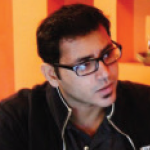When you’re on the consulting end, though, you are the last resort—or should be. A subspecialist has massive trust placed on their assessment and conclusions. My experience, as a trainee subspecialist, is that trust and responsibility are often amplified. Will you push your efforts, your gut feelings, your knowledge (or lack thereof) of a particular disease to the brink so as not to fail a complicated patient? You don’t have to be the best physician in the world, but you can be a decent human being, wanting to help sick and frightened people the best you can, and decency demands a degree of kindness and responsibility.
I hoped my patient’s extended myositis panel would reveal the antibody specific to her particular inflammatory myopathy (and it eventually did). I hoped we could then move on to an organized treatment plan, help her as best as we could. Yet I couldn’t shake the fear of failing her.
My patient isn’t the only one who likes running. I went home and ran a bit that night, thinking of her. Encaged by the fossilization of her flesh, she likely still dreams. She has plenty of time to think. She probably underlines sentences in the books she reads. She is unfailingly polite to me, but is she always polite to those around her? Infirmity can bring anger and bitterness. What is she like? What was she like? Who did she used to be? How cramped and tight and painful those shoes I was trying to put on briefly.
I hope she walks again, that one day, she gets out of that wheelchair and walks two steps, then a few more. A gunmetal sky above her, she doesn’t care. She plugs those headphones in, zips up her jacket and gently increases her pace. The road stretches before her, stark and quiet and beautiful. She smiles and stretches her arms out to the wind. Tentatively, she begins to run.
And running, she begins to sing.
 Usman T. Malik, MBBS, is a second-year rheumatology fellow, training at the University of Florida in Gainesville. In his spare time, he runs distance and writes tolerable speculative fiction.
Usman T. Malik, MBBS, is a second-year rheumatology fellow, training at the University of Florida in Gainesville. In his spare time, he runs distance and writes tolerable speculative fiction.



